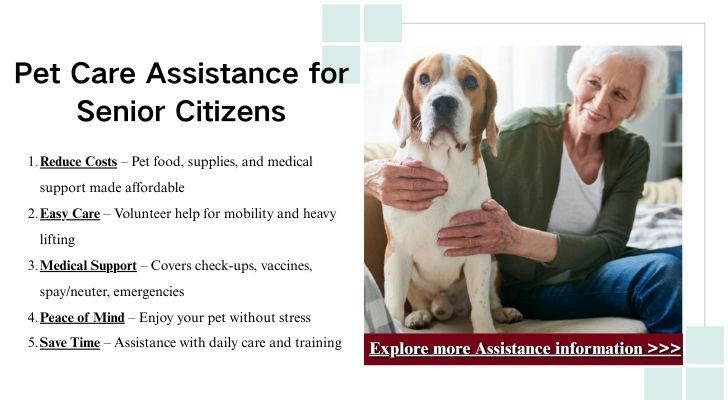Senior Pet Care Assistance in the United States
In the United States, many seniors consider their pets an essential part of their lives and a source of emotional support. Pets bring companionship, joy, and health benefits, but at the same time, the costs of food, medical care, and daily maintenance can be a heavy burden for seniors on fixed incomes.
To help seniors continue enjoying life with their pets, non-profit organizations and community agencies across the U.S. have launched various pet care assistance programs, ensuring that love and companionship are not interrupted by financial or physical limitations, creating a healthier and more secure life for both you and your pet.

Why Pet Care Support Is Important for Seniors
In the U.S., pets are considered part of the family. For seniors, pets provide essential companionship and emotional support. Studies show that owning a pet can help lower blood pressure, reduce anxiety, improve mood, and promote social interaction and physical activity. For those living alone, pets are often a key source of daily emotional support.
However, as people age, many seniors face limited income, mobility challenges, and inadequate access to healthcare. This can make it difficult to care for their pets, such as:
- Financial pressure from buying pet food and supplies;
- Inability to afford veterinary check-ups, vaccinations, or emergency care;
- Mobility limitations that make it hard to take pets to the vet or buy food;
- Lack of family assistance, leaving seniors to care for pets alone.
To address these challenges, non-profits, foundations, and community organizations across the U.S. offer pet care assistance programs that ensure seniors and their pets can enjoy a better quality of life.
Types of Pet Care Assistance for Seniors
1. Pet Food Assistance
Many food banks and community organizations regularly distribute pet food to help seniors reduce daily expenses. Some also arrange volunteers to deliver pet food directly to seniors' homes, solving mobility challenges.
2. Veterinary Care Support
Pet health is crucial for seniors, but veterinary costs can be high. Some assistance programs cover vaccinations, routine check-ups, spay/neuter surgeries, and even emergency medical expenses, ensuring pets receive necessary care.
3. Pet Health Supplies
Beyond food and medical care, pets need daily maintenance, such as flea treatments, litter, grooming tools, and hygiene supplies. These costs can be burdensome for seniors. Some programs provide these essential items to maintain pets’ health and quality of life.
4. Transportation and Delivery Services
Many seniors face mobility challenges that prevent them from taking pets to veterinary clinics. Some organizations offer transport services or volunteer escorts. Additionally, mobile pet clinics may visit communities directly to provide check-ups and treatments.
5. Pet Adoption Subsidies
For seniors wishing to adopt pets, some foundations cover adoption fees and part of medical expenses, reducing entry barriers. This helps seniors gain companionship while also easing the burden on animal shelters.
Major Pet Assistance Programs and Organizations
Meals on Wheels Pet Assistance Program
This program collaborates with pet charities to provide seniors with meals and deliver pet food and supplies. It is particularly helpful for seniors living alone or with mobility issues, ensuring both the senior and the pet are cared for.
Pets for the Elderly Foundation
This foundation provides adoption subsidies for seniors aged 60 and older, covering adoption fees, spaying/neutering, and basic medical expenses. Thousands of seniors have successfully adopted companion animals through this program.
PAWS (Pets Are Wonderful Support)
Covering multiple cities, PAWS offers comprehensive support for seniors and chronically ill individuals, including food, veterinary care, and volunteer assistance, helping seniors care for their pets with confidence.
Local Senior Services and Community Centers
Many states and counties have senior service agencies that maintain pet food pantries or provide small financial assistance. Some communities host regular “Pet Health Days,” offering check-ups for senior pets.
How to Access Pet Care Assistance
Seniors and their families can find resources by:
- Contacting local animal shelters, humane societies, or community pet organizations;
- Consulting senior centers or aging service agencies for available programs;
- Checking community announcements, nonprofit websites, or social service platforms for updates;
- Searching online for “Pet Care Assistance for Seniors” or “Senior Pet Programs near me” to find appropriate programs.
Frequently Asked Questions (FAQ)
Q1: Who is eligible for pet care assistance?
Most programs target seniors aged 60 and above, especially those with low income, no health insurance, or mobility challenges. Requirements may vary by program.
Q2: What types of pets are covered?
Primarily cats and dogs, though some organizations also assist with other small companion animals.
Q3: What proof is required to apply?
Some programs require proof of income or residence to confirm eligibility, while others have more open application policies.
Q4: Is the assistance long-term?
Some programs offer one-time support (e.g., adoption subsidies), while others provide ongoing assistance, such as regular food deliveries. Seniors can choose based on their needs.
Q5: What if there is no program in my community?
Contact local senior centers or animal welfare organizations. They often provide referrals to nearby resources.
💡 Summary and Next Steps
Pets provide unconditional companionship and love, but the costs and effort of care can exceed what some seniors can manage. Pet assistance programs across the U.S. help seniors access food, medical care, supplies, and companionship support, enabling them to continue sharing life with their pets.
Whether through regular food deliveries, essential veterinary care, or adoption subsidies, these programs help more seniors and their pets enjoy healthier, happier lives.
🚀 Call to Action
👉 Find pet care assistance programs near you today, ensuring the best support for you and your pet, and let love and companionship continue.
